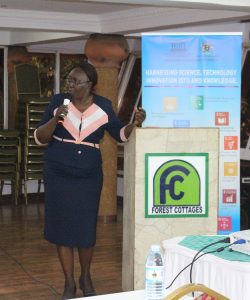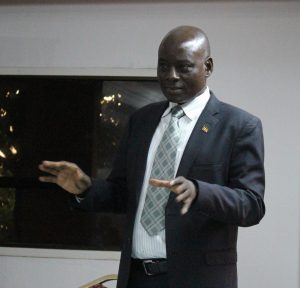By Vincent Ogal
Uganda National Commission for UNESCO (UNATCOM) guided by UNESCO’s Medium Term Framework (2014-2021) has been making several interventions in the science programme. One such intervention is the continued engagement in the two major science programmes namely; providing policy advice on science, technology and innovation (STI) and strengthening STI capacities, and enhancing international scientific cooperation for advancing inclusive sustainable development, exercise leadership in ocean and freshwater issues and develop holistic solutions to climate change adaptation and disaster risk reduction. Both interventions are meant to strategically bridge the multiple gaps between science, policy and society by mobilizing and supporting multidisciplinary scientific knowledge to inform decision-making and promoting the ethical, social, environmental and economic aspects of sustainable development.
In line with this, UNATCOM organized a high level consultative workshop on the improvement of science education and performance in natural sciences in secondary schools in Uganda. It seeks to promote the practice of integrated science for sustainable development, which draws on the full range of scientific, traditional and indigenous knowledge in a trans-disciplinary way to address economic, environmental, ethical and societal challenges.
While officiating at the opening of the one workshop, Ms. Rosie Agoi Secretary General of UNATCOM stated that, Uganda has for nearly two decades striven to enforce compulsory science education in the country. “ sciences have however not increased in popularity and performance has instead remained dismal as evident in UNEB’s yearly release of national examination results.” She noted. Thus, the situation of low popularity and dismal performance in the Natural Sciences at the Secondary School level in Uganda in the midst of high unemployment and declining growth indicators is of great concern and worry and calls for a special attention focused on understanding the problems facing the interest, learning and teaching of the sciences especially in Uganda’s Primary and Secondary Schools.
Objectives of the workshop
- To share information on the trends in the country regarding the popularity, learning and performance in sciences and the international recommendations on the learning of sciences, the status of scientists and scientific researchers.
- To build consensus amongst the education planners, teacher trainers and relevant stakeholders on the best way forward regarding the science teachers’ deployment, curriculum interpretation, teaching and learning of sciences and mathematics as well as assessments.
- To discuss and recommend mechanisms for improvement in the short, medium and the long term.
The Intervention done so far
 Ms. Rosie Agoi notes that, against the above background and problem and in line with the report of the UN Secretary-General’s Scientific Advisory Board (UNSG SAB) and UNESCO recommendation on status of scientists and scientific researchers of November 2017 on the initial education and training of scientific researchers. Uganda National Commission for UNESCO in collaboration with the Secondary Science and Mathematics Programme (SESEMAT) and the National Curriculum Development Centre (NCDC) commissioned a concurrent fact-finding and capacity building programme for Science and Mathematics teachers countrywide as one of the efforts to improve the situation.
Ms. Rosie Agoi notes that, against the above background and problem and in line with the report of the UN Secretary-General’s Scientific Advisory Board (UNSG SAB) and UNESCO recommendation on status of scientists and scientific researchers of November 2017 on the initial education and training of scientific researchers. Uganda National Commission for UNESCO in collaboration with the Secondary Science and Mathematics Programme (SESEMAT) and the National Curriculum Development Centre (NCDC) commissioned a concurrent fact-finding and capacity building programme for Science and Mathematics teachers countrywide as one of the efforts to improve the situation.
This was done by initiating teachers as champions in popularizing the Sciences and Mathematics with the view to generating interest that can boost the performance in the schools countrywide. The exercise was done twice, first in May 2017 in 50 Schools combining the best and worst performing schools and the second in January 2018 by concentrating only on 50 worst performing schools to build the teachers’ capacity in curriculum interpretation and use of appropriate pedagogues, provide knowledge and skills in improvisation of teaching and practical materials, teaching approaches for effective learning of sciences and mathematics and create awareness on the various opportunities for natural science-based careers.
Among the issues raised by the teachers relate to staff-related constraints including staff shortage, limited subject knowledge, limited interest of teachers in their teaching subjects and theoretical teaching. The teachers also raised their expectations for advanced training for building their capacity.
Proposed further Intervention
In light of the above situation, UNATCOM with the support from the Ministry of Education and Sports proposed to convene a high-level stakeholder’s workshop in Kampala to discuss the status of science education in the country and the need for new interventions to address the outstanding issues for the years ahead. This is also important at the time that the Ministry of Education and Sports is developing a new Education and Sports Sector Strategic Plan for 2021-2025 and the recently released results of UCE and UACE indicated low performance in sciences and in the case of Advanced level (UACE) only 10% of the candidates in 2018 offered sciences.
Participants
The workshop brought together 49 education partners from the Planning Department of the Ministry of Education Headquarters, Commissioners of Guidance and Counselling, Special needs, Higher Education Department, Teacher Instruction and Education (TIET), Business, Technical and Vocational Education and Training, Secondary Education (Private and Government), Primary Education (Private and Government), the Directors for Basic, TVET and Higher, Education Standards, Curriculum Specialists, Industrial Training and the Officials from Uganda National Examinations Board (UNEB).
Recommendation
The workshop came up with a number of recommendations which if implemented, will improve the status of science education in the country, they include;
- A call to the government of Uganda to increase investment in the science field from the current 1% to at least 3% of country’s GDP as recommended by UNSG SAB and the Addis Ababa Declaration
- Increasing pay for Science teachers to motivate and attract them
- Addressing the issue of shortage of teachers as a matter of urgency
- Making the public aware of the importance of science / scientific journalism
- Integrating the value system in teaching of sciences
 While delivering his closing remarks, the AG. Director, Basic and Secondary Education, Ministry of Education and Sports, Mr Ismael Mulindwa thanked UNATCOM for the interventions it is making in improving the status of science in Uganda. He underlined that, the recruitment of science teachers is limited by the constrained budget line of the ministry of education and sports but however pledged the continued support in addressing the looming challenges affecting science performance in Uganda.
While delivering his closing remarks, the AG. Director, Basic and Secondary Education, Ministry of Education and Sports, Mr Ismael Mulindwa thanked UNATCOM for the interventions it is making in improving the status of science in Uganda. He underlined that, the recruitment of science teachers is limited by the constrained budget line of the ministry of education and sports but however pledged the continued support in addressing the looming challenges affecting science performance in Uganda.
He further noted that one of the interventions the ministry embarked to address the challenges highlighted above is the development of National Science Policy that is yet to be published currently undergoing review.

